How AI is Transforming White-Collar Work in the Era of Agent Managers
![]() 06/25 2025
06/25 2025
![]() 674
674
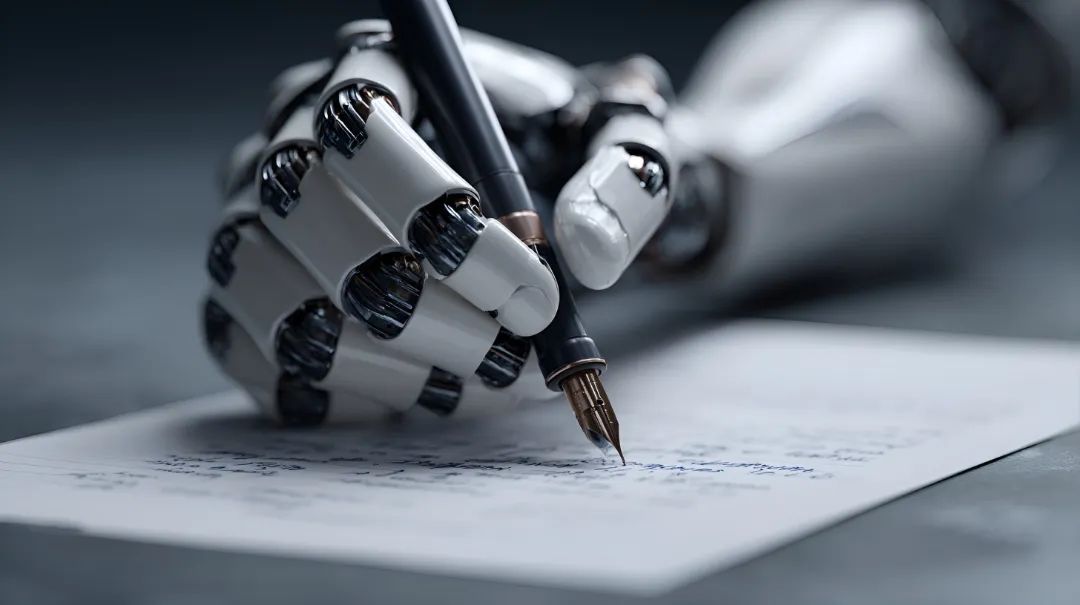
The replacement of standardized entry-level white-collar jobs by AI is an unfolding reality.
Author | Xiao Wei
Image Source | Shutterstock + Keling
The integration of humans and AI is poised to become the paramount productivity variable in the future. In 2025, a series of predictions by tech leaders intensified public anxiety about career development.
Anthropic CEO Dario Amodei warned that "half of entry-level white-collar jobs might be replaced by AI within the next five years";
Amazon CEO Andy Jassy bluntly stated that "with the adoption of more AI tools and agents, the number of company employees will decrease in the coming years";
"AI godfather" Geoffrey Hinton pointed out that "we must redefine human uniqueness because the old definition has already been surpassed by AI."
If industrialization and automation eliminated a significant number of blue-collar jobs characterized by high standardization and strong repetitiveness, today's AI is redefining the value of "white-collar" work. Currently, numerous agents have seamlessly integrated into the daily routines of white-collar workers, interfacing effortlessly with various office software. The boundaries of human and AI capabilities are being redefined.
At Microsoft Build 2025, the most pertinent announcement for professionals was the introduction of the intelligent Microsoft 365 Copilot and updates to Microsoft 365 Copilot Chat. Since their launch in 2023, these AI work assistants have continually evolved, enhancing functionality, usability, and connectivity.
Recently, Jessica Miao, General Manager of Microsoft Greater China's Modern Work Business Group, shared her insights on productivity transformation and organizational evolution in the AI era, underpinning product and technology updates.
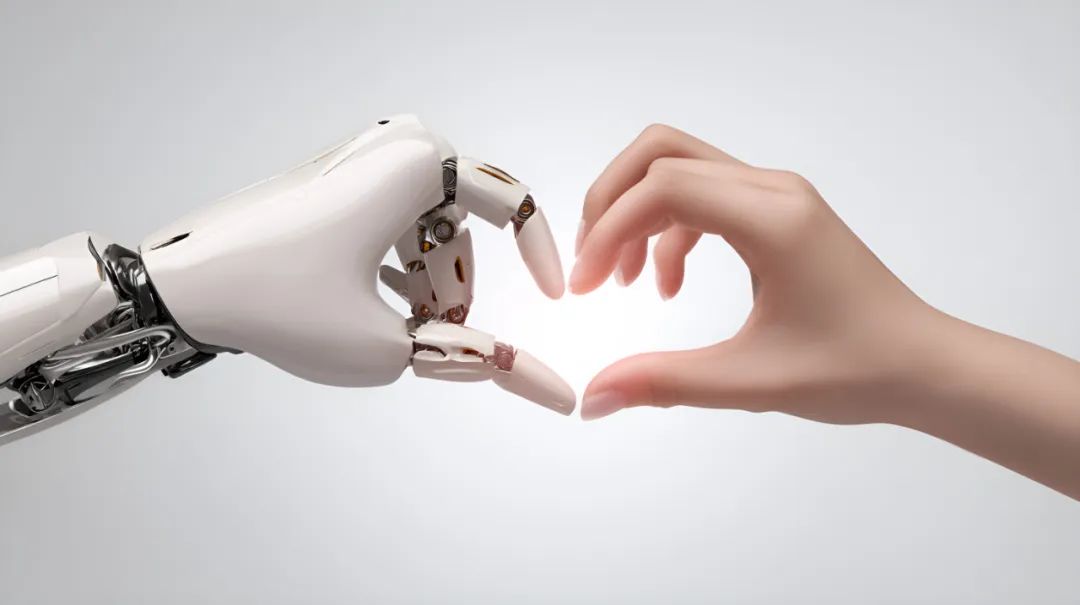

Embrace Change: Redefining Human Value
Whether we accept it or not, the replacement of standardized entry-level jobs by AI is an unfolding reality.
"AI will undoubtedly impact some traditional jobs. I believe that entry-level administrative roles, such as sales assistants and law firm interns, will be affected to some extent. However, mid-level positions that require time and experience accumulation can highlight human advantages," Jessica Miao told "Intelligence Evolution Theory".
A survey report by venture capital firm SignalFire supports this view, stating that the number of new graduates hired by large US technology companies in 2024 decreased by 25% compared to 2023. Asher Bantock, Director of Research at SignalFire, said that AI is a significant contributing factor.
Anthropic CEO Dario Amodei shares a similar perspective, "It's not manufacturing workers or servers being replaced, but the most basic white-collar office jobs – financial assistants, legal assistants, marketing specialists, junior programmers, data analysis interns, etc. If you have less than three years of experience and your work is repetitive, AI can replace you almost seamlessly."
Such challenges also present an opportunity for everyone to re-examine human value and uncover advantages that AI still lacks.
"For emotional, moral, and value-based decisions, although agents can provide advice, they cannot currently autonomously and fully make decisions for employees," Jessica Miao said.
She cited LinkedIn's "Global Workplace Transformation Report 2025," which identified the five most important skills in 2025: 1. AI literacy, 2. Conflict resolution, 3. Adaptability to change, 4. Process optimization, 5. Innovative thinking.
It is evident that, except for the first skill related to AI, the others can be categorized as "soft skills." In other words, all complex tasks without clear standard answers, represented by organizational coordination, interpersonal communication, and emotional interaction, remain human territory.
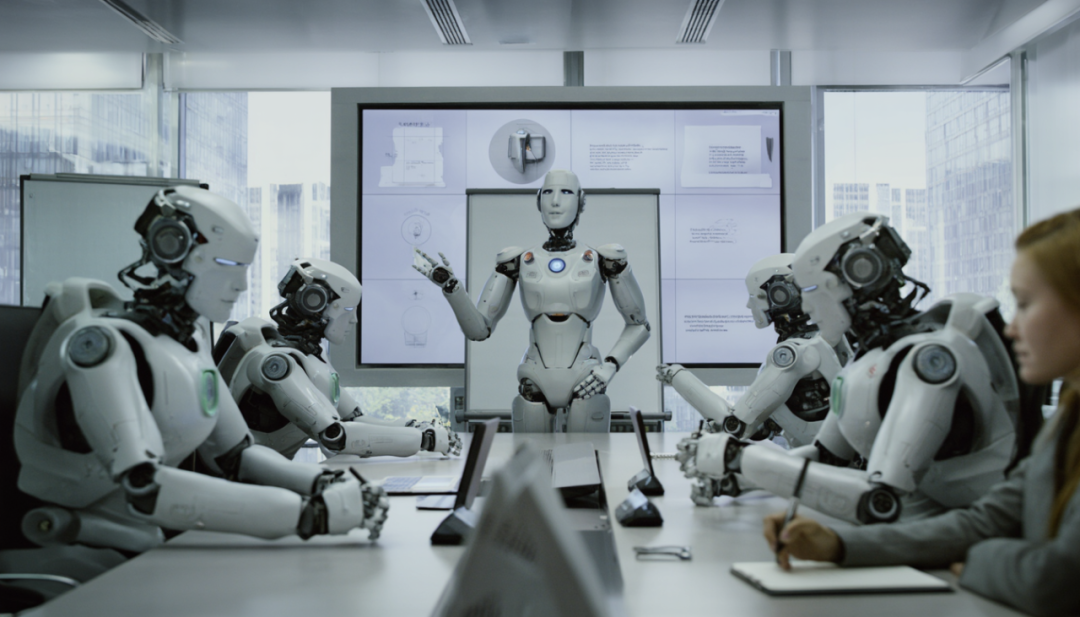

Individual Upgrading: Everyone is an Agent Manager
For individual employees, building a dual-capability model that combines AI and human strengths is essential to face future challenges.
In Microsoft's 2025 Work Trend Index Annual Report, 57% of surveyed Chinese enterprise leaders said their organizations use agents to automate business processes. 63% of employees already view AI as a thinking partner, while 36% still see AI as a command-based tool.
"We have always believed that AI is an excellent work partner for human employees, helping overcome many problems that human employees cannot solve. I prefer to define AI as a super toolbox that every employee possesses," Jessica Miao said.
Considering the current value and role of agents in modern offices, the synergistic evolution of employees and agents can be categorized into three major trends:
Trend 1: Human employees will become Agent managers
Jessica Miao believes that the relationship between human employees and agents can be divided into three stages:
Stage 1: Each employee has their own AI assistant;
Stage 2: Human employees guide digital employees to collaborate;
Stage 3: Human employees become Agent managers, responsible for formulating strategies, continuously optimizing the performance of all agents, and being accountable for decision outcomes.
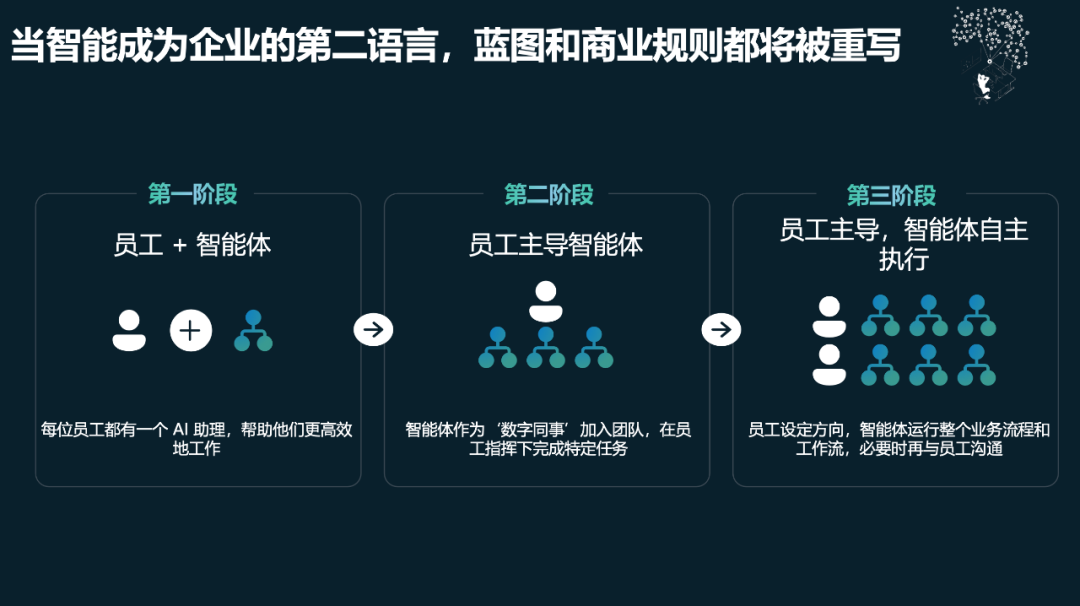
Many enterprises have already reached the second stage. Taking the use of intelligent Microsoft 365 Copilot as an example, it seamlessly integrates with work information in Microsoft 365, enabling users to work smoothly without separately opening Word, PPT, Outlook, and other software. AI-native vector search technology allows users to search for all semantically related work content without entering precise keywords.
Currently, intelligent Microsoft 365 Copilot has integrated a wealth of Microsoft-original and third-party ecosystem agents, with the Agent Store becoming increasingly rich. For example, Analyst is a data insights analyst, Researcher can help employees write analysis reports, and Idea Coach is a good assistant for building creativity, all of which are frequently used by employees.
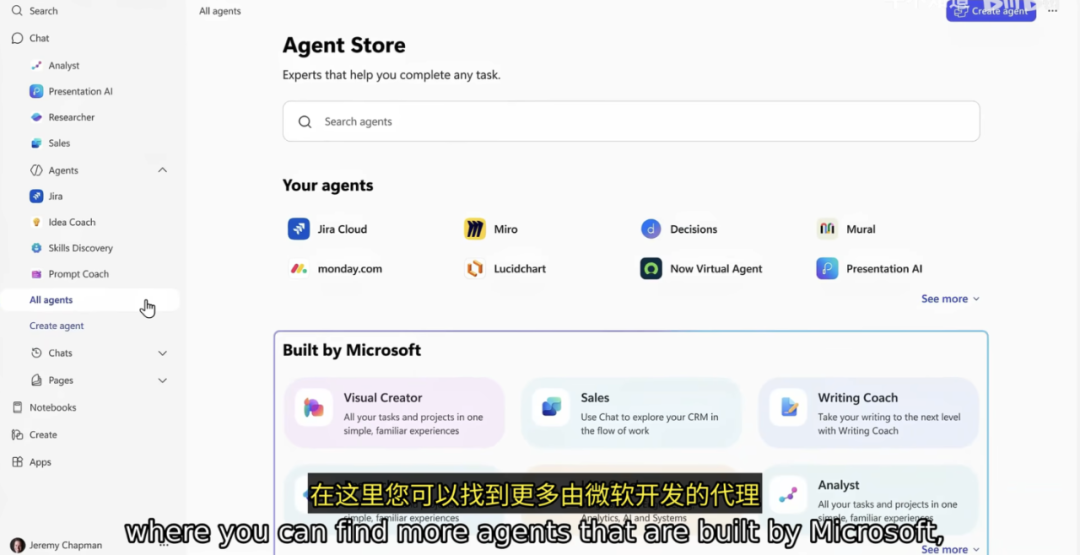
Trend 2: AI will force newcomers to grow rapidly, changing traditional talent development models
AI will accelerate the process of newcomers becoming proficient. In the past, newcomers or interns often started with very basic tasks, which AI can now perform better. This places higher demands on the learning abilities of newcomers.
Newcomers need to master more complex and advanced skills in a shorter time, proficiently use AI tools, independently solve problems, and even conduct project management. Compared to previous generations of professionals, this may expose newcomers to challenges such as independent tasks, project management, and cross-departmental collaboration earlier in their careers. Efficiently using AI tools is one of the keys to addressing these challenges.
Trend 3: Employees must not only use AI well but also learn to use AI to amplify human advantages
Bypassing AI's strengths in tool-based and data analysis tasks, using AI to amplify human-unique advantages such as emotional resonance, cultural understanding, and value judgment is also a direction for iterating professional value. For example, marketing managers can leverage AI to customize marketing copy from the perspectives of cultural insight and scenario empathy, establishing a deep emotional connection with consumers.

Organizational Transformation: From Adapting to AI to Designing for AI
Currently, the mainstream organizational model of enterprises still follows the structure of the industrial era, and the AI era will inevitably face significant disruption and reconstruction.
Future enterprise organizations need to upgrade from adapting to AI to designing for AI. In the 2025 Work Trend Index Annual Report, Microsoft proposed the concept of Frontier Firms: they possess on-demand intelligence, form teams through the interaction of employees and agents, and everyone assumes the new role of "agent manager".
Subsequently, a series of unprecedented organizational structure designs have been proposed. For example, enterprises need to introduce a new metric: employee-to-agent ratio. Leaders must consider two key questions: how many agents are needed for each role and task? How many employees are required to guide these agents? And how to clarify the division of responsibilities, such as who makes decisions and who is accountable.
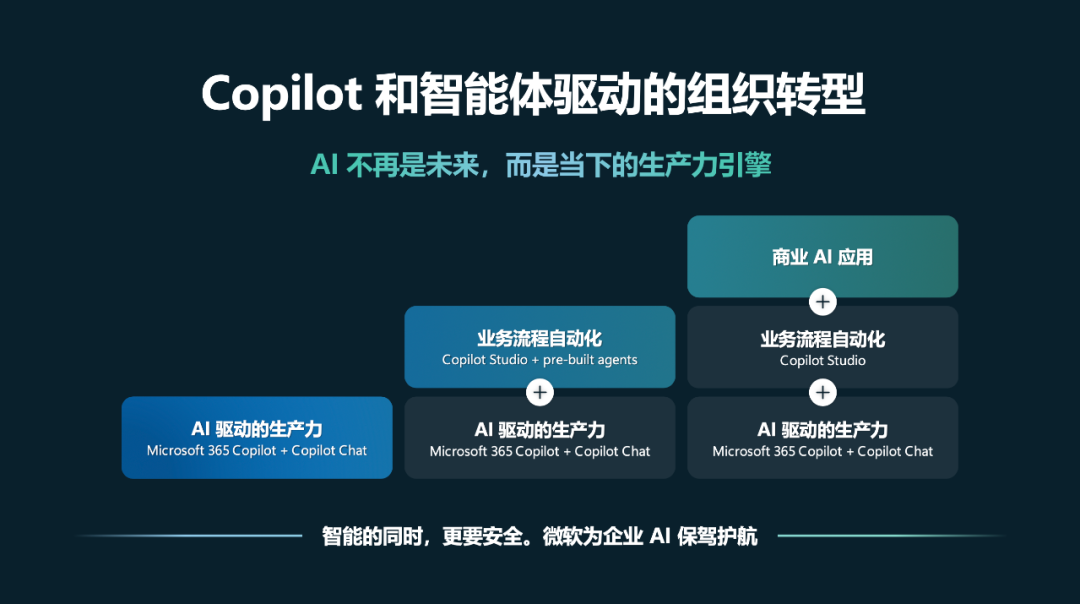
Under the goal of Frontier Firms, the organizational transformation driven by agents has three key stages:
Stage 1: AI-driven productivity enhancement
"From the explosion of generative AI in 2023 to the present, Microsoft has been committed to transforming AI from a technological vision into tangible productivity tools for enterprises," Jessica Miao said.
Currently, 90% of Fortune 500 companies are already using intelligent Microsoft 365 Copilot. However, Jessica Miao emphasized that the target customer profile for intelligent Microsoft 365 Copilot is all enterprises willing to empower their employees and enhance their productivity, regardless of size.
Stage 2: AI accelerates business process automation
The agent creation platform becomes the key to integrating AI into business processes. The low-code development platform Copilot studio supports new features such as Multi-Agent Orchestration and Maker Controls, making it easier for users to create and manage personalized agents. Additionally, business personnel can create agents through zero-code platforms like Agent Builder, democratizing innovation capabilities for everyone.
Stage 3: AI integration into business applications
Building on the first two stages, when enterprises integrate AI capabilities into core systems such as ERP and CRM, AI transforms from an auxiliary tool to a support for the enterprise's core competitiveness.
Conclusion
While the Industrial Revolution liberated human hands with machinery, the AI Revolution is reshaping the value of knowledge labor with a new combination of productivity.
As the boundaries of AI skills continue to expand, humans have also learned to boldly make choices within their existing skill sets. As the coupling of human-AI collaboration increases, this paradigm shift in productivity will ultimately rewrite the survival rules for individuals and enterprises.
END This is an original work of "Intelligence Evolution Theory". Welcome to follow us.







